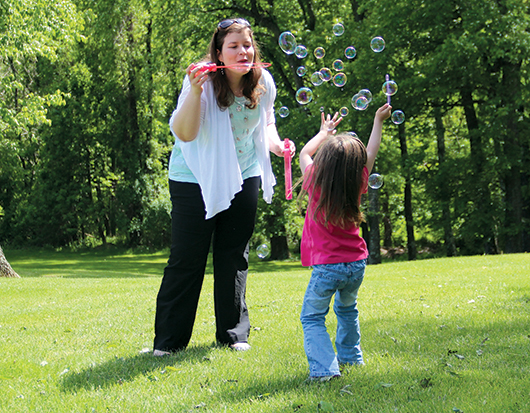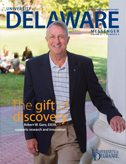
Learning language is play on words
ALUMNI | It seems that Jennifer Zosh, AS03, was destined to study the development of young children. As a teenager, she babysat and played school with them, always marveling at the spark she could see in their eyes when something clicked.
While picking classes as a psychology major at UD, Zosh took a child development class alongside a “risky” class she knew nothing about, Introduction to Cognitive Science, just to try something completely new. Though she didn’t realize it at the time, the courses would shape her future.
The research she conducted for those classes inspired her to combine the two fields and begin investigating early cognitive development. She went on to earn master’s and doctoral degrees in psychological and brain sciences from Johns Hopkins University.
Now, as the director of the Brandywine Child Development Lab at Penn State Brandywine, she is able to explore her primary interest—studying the way young children develop and learn about the world around them.
“I have been continually impressed at the way infants begin life with little control, no understanding of language, no relationships and no instruction manual and yet quickly become walking, talking, loving and hilarious little beings,” Zosh says.
At UD, she worked with Roberta Golinkoff, now H. Rodney Sharp Professor of Education as well as a professor of linguistics and cognitive science and of psychology, at the Infant Language Project, where she learned how to conduct research and began to evaluate how children learn language.
At Hopkins, one of Zosh’s projects investigated the way toddlers learn new words. Working with one of her advisers, Justin Halberda, and a then-undergraduate, Meredith Brinster, they concluded that young children are better able to retain words when they “figure it out for themselves” rather than when they are explicitly told. Their findings were announced on major news outlets, including Yahoo News, NBC Science News, Huffington Post and Fox.
“The Internet is full of so much information—and so much inaccurate information—that it was great to be able to contribute scientifically based information about word learning that made it directly into the hands of parents,” Zosh says.
She continues to collaborate with Golinkoff and others on research examining how socio-economic status may affect young children’s ability to estimate large numbers of objects, a skill important to math achievement. If a connection is found, the researchers hope that subsequent interventions could have long-term positive implications for disadvantaged children.
Zosh is also involved with Golinkoff on the annual Ultimate Block Party, which highlights the importance of play to a child’s physical, cognitive, social and emotional development and helps bring research from the lab directly into the hands of the public.
With so many initiatives under way, there is no “average day” for Zosh, who divides her time between the lab and classroom. In both cases, she calls working with undergraduates “some of the most fulfilling moments” she experiences.
“I think that partly this is because it reminds me of my own joy at being a part of the scientific process and experiencing the thrill of discovery when I was an undergraduate at UD,” she says.
Article by Robert Bartley, AS13






